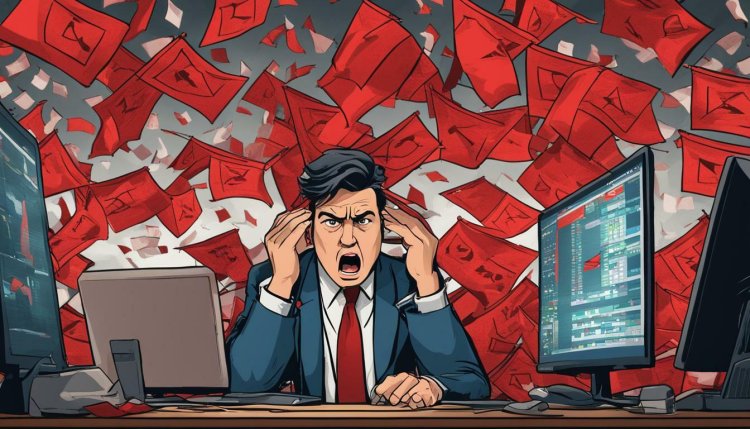Top 10 Mistakes Even Experienced Forex Traders Make: Learn & Avoid
Avoid the top "10 mistakes even experienced forex traders make"! Enhance your strategy with our savvy tips. Navigate the forex market like a pro.

Top 10 Mistakes Even Experienced Forex Traders Make: Learn and Avoid
Forex trading can be a lucrative way to invest your money, but it's not without its risks. Even experienced traders can fall prey to common mistakes that can hurt their bottom line. In this section, we'll explore the top 10 mistakes that even experienced forex traders make and provide you with tips on how to avoid them.
By learning from the mistakes of others, you can enhance your trading strategy and navigate the forex market like a pro. Remember that nobody is perfect, and it's okay to make mistakes. The key is to learn from them and use that knowledge to improve your trading game.
Key Takeaways
- Even experienced forex traders can make mistakes.
- Learning from the mistakes of others can help you avoid common pitfalls.
- Don't be too hard on yourself if you make a mistake; use it as a learning opportunity.
- Enhancing your trading strategy can help you navigate the forex market like a pro.
- The key to success in forex trading is to learn from your mistakes and keep striving to improve.
Lack of risk management
Congratulations! You made your first profitable Forex trade. But don't break out the champagne just yet. One of the most common mistakes in forex trading is a lack of proper risk management. This error can lead to devastating losses, even for experienced traders like yourself.
So, what can you do to avoid this pitfall? The first step is to limit your risk by setting stop-loss orders. These orders will automatically close your position when the market moves against you, preventing further losses. You can also use take-profit orders to lock in profits at predetermined levels.
Another important strategy is to diversify your portfolio. Don't put all your financial eggs in one basket. Spread your risk by investing in different currency pairs and across various asset classes.
Remember, trading is a marathon, not a sprint. Don't try to get rich quick by risking too much on a single trade. Be patient, stick to your trading plan, and always keep an eye on your risk management strategies.
"The essence of investment management is the management of risks, not the management of returns." Benjamin Graham
Overtrading: The Foolish Blunder of Even Experienced Traders
Picture this: you just made a couple of profitable trades, and that hunger for more leads you to keep clicking away like a maniac. Before you know it, you've lost more than you ever earned. Congratulations! You've just fallen prey to the classic mistake of overtrading!
When it comes to forex trading, it's not just about how much you trade but also how carefully you trade. Overtrading leads to rash decisions, fatigue, and impulsive moves that can be disastrous for even experienced traders. It's a sure-shot way to wipe out your hard-earned profits and blow up your account.
Don't believe us? A recent study reveals that over 70% of traders who overtrade end up losing money. That's a pretty clear indicator that you should avoid this forex trading pitfall at all costs.
So, how can you avoid overtrading and become a smart trader instead? Firstly, stick to your trading plan and avoid entering into trades that do not align with your strategy. Secondly, set trading goals and limits and never exceed them. Thirdly, take breaks and refresh yourself, especially after a string of losing trades.
Remember, in forex trading, patience is key. Don't fall prey to the temptation of overtrading to make quick money. It's not worth the risk, and the consequences can be disastrous.
"The goal of a successful trader is to make the best trades. Money is secondary."
Take it from Alexander Elder, a world-renowned trader and author. In forex trading, it's not about making the most trades; it's about making the best and smartest trades. Avoid the pitfalls of overtrading, and remember to trade with discipline, patience, and a well-defined strategy. Happy trading!
Ignoring Fundamental Analysis: A Grave Forex Trading Blunder
When it comes to forex trading, there are few things more crucial than understanding fundamental analysis. Ignoring this aspect of trading can be a grave blunder that even experienced forex traders make. So, what exactly is fundamental analysis?
Fundamental analysis is the study of economic, financial, and other qualitative and quantitative factors to gain a comprehensive understanding of an asset's intrinsic value and future performance.
In other words, fundamental analysis helps you evaluate the underlying factors that are impacting the market and make informed trading decisions based on those factors. Ignoring it is like walking into a dark room without a flashlight—you might stumble around a bit, but you won't know where you're going or how to get there.
Before placing a trade, consider analysing factors like economic indicators, interest rates, and political events that may impact the market. By understanding fundamental analysis, you can gain a deeper understanding of the market and make more informed trading decisions.
So, make sure to take the time to understand fundamental analysis and its impact on your trades. It can mean the difference between a profitable trade and a costly mistake. Don't make the common errors in forex trading; take control of your trading journey with a strong foundation of fundamental analysis.
Emotional Trading: Don't Let Your Feelings Ruin Your Trades
You might think that your emotions have no place in forex trading. After all, it's all about numbers and analysis, right? Well, not exactly. Your emotions can play a significant role in your trading decisions, and it's essential to be aware of this fact.
Many top traders have mastered the art of controlling their emotions and sticking to their trading plans. However, many traders still fall prey to emotional trading, making impulsive decisions based on fear, greed, or even excitement.
One way to avoid emotional trading is to try to copy trading or social trading. Copy trading allows you to follow and copy the trades of successful traders automatically. By doing so, you are taking the emotions out of your trading decisions, and you can learn from the strategies of top traders.
Another way to prevent emotional trading is to cultivate trading psychology, which involves developing positive habits and attitudes toward trading. One technique is to keep a journal of your trades and emotions. By tracking your feelings, you can identify patterns and learn to control them.
Remember, emotional trading can lead to disastrous results, such as overtrading, failing to cut losses, or chasing profits. Don't let your feelings ruin your trades!
Lack of a Trading Plan
Oh, you fearless trader! You dive headfirst into the forex market without any plan of action? That’s like jumping out of an airplane without a parachute. You may enjoy the thrill of the moment, but the end result won’t be pretty.
It’s essential to have a well-defined trading plan. Without one, you may make impulsive trading decisions driven by emotions. And, as we learned earlier, that's a big no-no.
Creating a trading plan may seem daunting, but it's not as difficult as you think. Start by setting achievable goals and determining the type of trader you want to be. Are you a day trader or a swing trader? What's your risk tolerance?
Once you've established your goals and trading style, you can start laying out your plan. This should include the timeframes you'll trade, entry and exit points, stop-loss and take-profit levels, and risk management strategies.
By having a trading plan, you'll have a roadmap for your trades and be better equipped to handle unexpected market movements. So don’t neglect this crucial step in your trading journey.
Chasing Profits: The Deadly Temptation
Let's be honest, making money in forex is the ultimate goal. But chasing profits can be a fatal mistake. You might have heard the phrase "cutting your losses short and letting your profits run." Well, the opposite is true when you're chasing profits. You're allowing your losses to run rampant and your profits to shrink.
It's simple to become distracted by the promise of significant gains and lose sight of the inherent risks. But what happens when you lose money? Are you prepared to deal with the consequences?
Think of your forex investments as a second income, not a get-rich-quick scheme. By focusing on consistent profits, you can recover losses and build a sustainable trading strategy.
So, how do you avoid the temptation to chase profits? First, set realistic goals and stick to them. Don't let greed cloud your judgement. Second, implement a risk management strategy that includes stop-loss orders and appropriate position sizing.
Remember, forex trading is not a sprint; it's a marathon. Don't let the desire for quick profits derail your long-term success.
Neglecting Stop Loss Orders: A Costly Mistake
Ignoring stop-loss orders is a common mistake that can lead to significant losses, especially in volatile forex markets. Stop-loss orders are designed to limit your trading losses by automatically closing your position when the price reaches a certain level.
Without stop-loss orders, you risk losing more than you can afford, making it much harder to recover losses.
Don't be a victim of this mistake! Protect your investments by implementing stop-loss orders in your trading strategy. It's a low-risk way to safeguard your trades and avoid costly setbacks.
Not sure how to do it? Consult with your forex broker, like TradeFxP, or search for online resources to learn more about stop-loss orders and how they can help you recover losses.
Keep in mind that forex trading is a risky business, but by using stop-loss orders, you can trade with more confidence and peace of mind.
Lack of Patience: Slow and Steady Wins the Race
Ah, impatience. It's the downfall of many forex traders. You want to see immediate results, and you want them now. But here's the thing: Forex trading is a marathon, not a sprint.
You need to be patient and stick to your trading plan. Don't let your emotions get the best of you, and don't make impulsive trades. Take your time and let the market come to you.
Remember, Rome wasn't built in a day, and neither is a successful forex trading career.
So, how can you cultivate patience as a forex trader? One way is to focus on the long term. Set realistic goals and work towards them steadily. Another way is to practice mindfulness and meditation. Clear your mind and focus on the present moment, rather than worrying about what the market will do next.
At the end of the day, it's all about discipline and self-control. Keep your eye on the prize, and don't let impatience get in the way of your success.
Not Keeping Up with Market News
Are you the type of forex trader who ignores the importance of staying up-to-date with market news and events? Well, my dear friend, you're making a grave mistake. Keeping an eye on forex news and economic calendar releases is crucial for making informed trading decisions.
Live trading is all about being in the know. Not only does it help you stay updated with the latest industry trends, but it also has a significant impact on your trading psychology. When you're aware of the latest market developments, you feel more confident in your trading strategy. On the other hand, a lack of knowledge can cause uncertainty and lead to hasty or irrational decisions.
The good news is that you don't have to scour the internet for news articles and economic reports by yourself. There are numerous resources available to help you stay informed. One of the most effective tools for staying updated is an economic calendar. Economic calendars highlight upcoming news releases, allowing you to plan and adapt your trading strategy accordingly.
So, make sure you're keeping up with market news, economic calendar releases, and live trading updates to stay ahead of the game. Trust me, it's one mistake you don't want to make.
"Staying informed is half the battle when it comes to successful forex trading. Don't neglect the power of knowledge."
Lack of Trading Discipline: Are You Sabotaging Your Own Success?
Picture this: you've done your research, analysed the charts, and finally made a trading decision. But as soon as you enter the trade, fear and doubt creep in. Suddenly, you're tweaking your strategy, second-guessing yourself, and making impulsive decisions.
This lack of trading discipline can be detrimental to your success in forex trading. By not sticking to your trading plan and allowing emotions to cloud your judgement, you're effectively sabotaging your own efforts.
So, how do you develop and maintain trading discipline? It starts with setting clear goals and defining your risk tolerance. By knowing exactly what you hope to achieve and how much you're willing to risk, you can avoid making rash decisions based on fear or greed.
Additionally, it's important to stay objective and logical when analysing market trends and making trades. Don't let your emotions drive your decisions; instead, rely on technical analysis and a solid understanding of market fundamentals.
Finally, remember that discipline is not just about making rational decisions; it's also about having the patience and consistency to follow through on your trading plan. Stay committed to your strategy and have faith in your research; don't let temporary losses or fluctuations demotivate you.
- Set clear goals and define your risk tolerance.
- Stay objective and rely on technical analysis and market fundamentals.
- Have patience and consistency to follow through on your trading plan.
By developing and maintaining trading discipline, you can avoid the common mistake of sabotaging your own success in forex trading.
Let's face it, forex trading can be a rollercoaster ride. It's easy to get caught up in the rush of making money or the fear of losing it all. That's why having trading discipline is crucial to your success.
Trading discipline means sticking to a plan and not letting emotions dictate your decisions. It means having the patience to wait for the right opportunity and the discipline to cut your losses when things don't go as planned.
One way to develop trading discipline is to create a set of rules for yourself. Write down your entry and exit points, and stick to them no matter what. Use stop-loss orders to limit your losses and take-profit orders to lock in your gains.
Technical Analysis
Another way to improve your trading discipline is to use technical analysis. This involves studying charts and price movements to identify trends and patterns. By doing so, you can make more informed trading decisions based on data rather than emotions.
There are many resources available online to help you learn technical analysis, including TradeFxP's educational materials. Take advantage of these resources to gain a better understanding of the markets and improve your trading discipline.
Conclusion
Developing trading discipline is an essential part of becoming a successful forex trader. By sticking to a plan, using stop-loss and take-profit orders, and utilizing technical analysis, you can avoid impulsive decisions and make more informed trades. Remember, trading is a long-term game, and success comes from discipline and patience.
At TradeFxP, we're committed to helping you achieve your trading goals. Sign up today to access our cutting-edge trading platform and educational resources.
FAQ
Q: What are the top 10 mistakes even experienced forex traders make?
Mistakes such as lack of risk management, overtrading, ignoring fundamental analysis, emotional trading, lack of a trading plan, chasing profits, neglecting stop-loss orders, lack of patience, not keeping up with market news and lack of trading discipline are common among experienced forex traders.
Q: Why is risk management important in forex trading?
Proper risk management is crucial in forex trading, as it helps protect your capital and minimise potential losses. By setting stop-loss orders and defining risk-reward ratios, you can effectively manage your exposure to market volatility.
Q: What are the dangers of overtrading?
Overtrading can lead to exhaustion, emotional decision-making, and increased transaction costs. It is important to trade strategically and not become caught up in excessive trading activity.
Q: Why is fundamental analysis important in forex trading?
Fundamental analysis helps traders understand the economic factors that impact currency movements. By considering economic indicators, news events, and central bank actions, traders can make more informed trading decisions.
Q: How can I overcome emotional trading?
To overcome emotional trading, it is important to develop a disciplined mindset, set realistic expectations, and use techniques such as meditation or journaling to manage emotions. Seeking support from other traders or utilising automated trading systems can also help reduce emotional decision-making.
Q: Why do I need a trading plan?
A trading plan helps provide structure and consistency to your trading activities. It outlines your trading goals, risk tolerance, entry and exit criteria, and overall strategy. Having a plan can help you stay focused and make rational decisions.
Q: Why is chasing profits a mistake in forex trading?
Chasing profits often leads to impulsive and irrational decision-making. It is more beneficial to focus on consistent and sustainable trading strategies rather than constantly striving for immediate gains.
Q: How can stop-loss orders help me avoid significant losses?
Stop-loss orders allow you to automatically exit a trade if it reaches a predetermined price level, limiting your potential losses. By implementing stop-loss orders, you can protect your capital and manage risk effectively.
Q: What role does patience play in forex trading?
Patience is crucial in forex trading, as it allows you to wait for optimal trade setups and avoid impulsive decisions. By cultivating patience, you can trade with a clear mind and stick to your trading plan.
Q: Why is it important to keep up with market news?
A: Staying informed about market news and events allows you to understand the potential impact on currency movements and adjust your trading strategy accordingly. Utilising resources such as economic calendars and news platforms can help you stay updated.
Q: How can I maintain trading discipline?
Maintaining trading discipline requires self-control, adherence to your trading plan, and the ability to manage emotions. It can be helpful to set specific rules for yourself and regularly evaluate your trading activities to ensure you are staying disciplined.
Q: How should I wrap up the article on the top 10 mistakes even experienced forex traders make?
In conclusion, it is important for forex traders to be aware of the common mistakes made by even experienced traders. By learning from these errors and implementing strategies to avoid them, you can enhance your trading strategy and increase your chances of success in the forex market.
Having said that….
You can join our Forex Managed account program and earn 1-2% profits daily. See for yourself by clicking the below link.
Have a great journey, and may you catch some big waves on your way to prosperity!
To see Ai Forex Trading for real, click here.
https://www.myfxbook.com/members/SankarGanesan/TradeFxP-trend-antitrend-day-trading/10404725
To read why you should be with us, click here
To open an account, click here.
To see our regulation certificate: click here.
To see our news with the IFMRRC: click here.
For claims, click here.
For the main site: click here.
For blogs and articles: click here.
Main Website: www.TradeFxP.com



 admin
admin 










